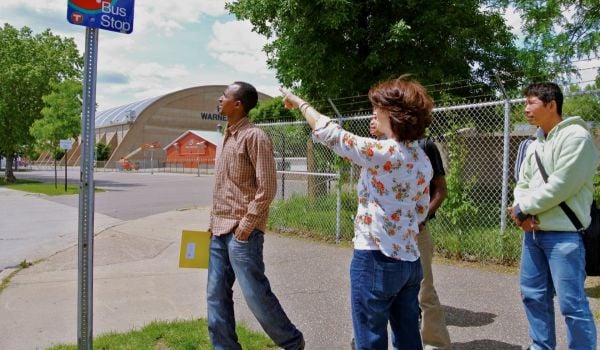At a forum in Boston last summer, New York City Mayor Michael Bloomberg made the highest-profile case so far for the adoption of place-based visas in the U.S.
Here’s the general idea: States or cities in search of residents would fast-track visas for immigrants who promise to make a new home within their borders. Bloomberg saw this not only as an opportunity for immigrants in search of a new life, but for localities suffering from population loss, stilted economies and excesses of vacant land.
As Nancy Scola, who in Forefront this week looks at existing place-based visa programs in Canada to see if they any viability south of the border, describes Bloomberg’s plea:
Carefully appointed in a mauve shirt and purple tie, Bloomberg drew his hands together as if praying for something. The very best hope for stemming America’s urban contraction, the mayor detailed, is to offer immigrants a bold this new deal. “We’re going to assign you a city,” he said. “Let’s say Detroit. You’ve got to agree to not be arrested and not take any federal, state or city money, and you’ve got to live there for seven years. And if you survive seven years, we’ll make you and your family citizens.” These new arrivals, the mayor said, will revive urban landscapes: Fixing up houses, founding businesses, agitating for better schools. It might be the only hope. “Other than that,” Bloomberg said, “I don’t know [if] there’s any great solution.”
The notion — and Bloomberg’s perhaps unfortunate decision to focus on Detroit, America’s perennial poster child for urban decay — set off a small brouhaha. Detroit Mayor Dave Bing even had to deny that his administration would look into adopting any such practice.
But Bloomberg is hardly the only American to have championed the idea of place-based visas. At present, the biggest push probably comes from the NYU Urbanization Project, a research effort founded by economist Paul Romer and focused on international urban growth. Brandon Fuller, a research scholar with the project, wrote what’s become a much-cited blog post about how place-based visas can help cities like Baltimore, Dayton, Ohio and yes, Detroit, slow population loss.
Fuller acknowledges that not every local government would welcome new immigrants with open arms. (In Scola’s story, for instance, more than one person cites Arizona as a place that would become even less friendly to newcomers should the feds devolve some immigration authority to states.) But with limited oversight from the Department of Homeland security, those states that want them could accept more immigrants at a faster rate than possible under a strictly federal immigration program.
“A policy that allows a greater number of law-abiding immigrants into the American cities that want them most could do more for global welfare than other policies related to trade and aid,” Fuller writes. “An effective policy of this sort would be a win-win.”
As for concerns over limiting where new immigrants can live, Fuller notes in a follow-up post that the “U.S. already places restrictions on temporary work visas,” such as those tying an immigrant to a sponsoring firm. “Just as an H-1B visa holder can transfer to a new sponsoring firm,” Fuller writes, “a city-based scheme could allow visa holders to transfer to a different sponsoring city.”
Richard Florida gave Fuller’s take on city-based visas a rundown on The Atlantic Cities last fall. While he stopped short of endorsing it, place-based immigration does align with Florida’s theory that cities ought to do what they can to attract the highly-skilled professional class. (Just in this case, members of that class are immigrants from abroad rather than upwardly mobile yuppies at home.)
One conservative response came from Reihan Salam at the National Review’s domestic policy blog. Salam considers the potential pitfall of immigrants choosing not to live, as promised, in a Detroit or a Baltimore after all. But he ultimately voices support for place-based visas, writing, “[m]y sense… is that demand for the opportunity to live and work in the U.S. — even in a depressed economic region — is sufficiently great that this problem would prove surmountable.”
Writing in January about a Congressional attempt at immigration reform, Forbes’ Adam Ozimek brings up regional visas as a policy he’d like to see lawmakers explore. He argues that place-based visas would help keep wages fair — as immigrant employees would be free to bring their talents anywhere within their given region — and let cities or states determine how much immigration they want, allowing for nuance that wouldn’t occur in a federal policy. Ozimek also proposes a requirement that the visa holder buy a house, so as to ensure investment in the region.
Despite the blessings of those listed here and more, the idea of cities or states issuing their own visas still raises eyebrows in the U.S. To find out whether the country really is on track to embrace a place-based immigration policy, check out the (free) Forefront story, “Welcome to Winnipeg, Now Don’t Move.”





_600_350_80_s_c1.jpg)










